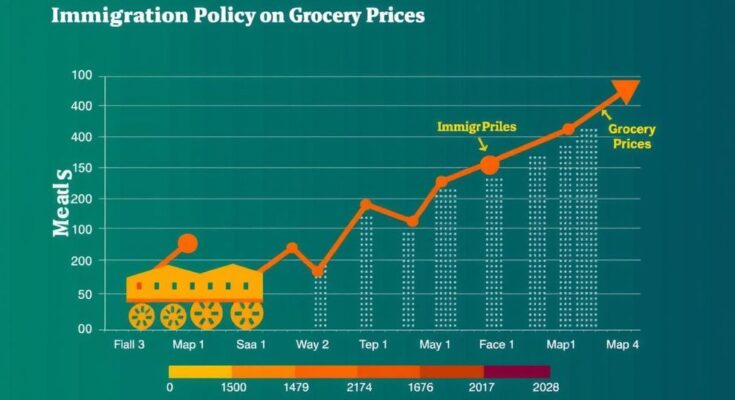Nobel-prize winning economist Paul Krugman warns that Donald Trump’s immigration policies could inflate prices on groceries and housing. His proposed mass deportations might create labor shortages in crucial sectors, driving costs up for consumers. Trump’s administration vows to enforce stringent border controls, raising concerns about the broader economic implications of these tactics.
A somber economic forecast looms over President-elect Donald Trump’s immigration plan, as Nobel laureate Paul Krugman warns of potential inflationary pressures on essential goods like groceries and housing. In his recent column for the New York Times, Krugman highlighted the risks inherent in Trump’s proposed mass deportations and rigid border policies, arguing that these could lead to significant labor shortages in the agricultural and construction sectors. Such shortages would likely drive prices up, imposing hardship on consumers. Krugman reminds us that immigrants represent a staggering three-quarters of agricultural laborers, with almost half being undocumented. Their absence could force industries such as food processing to escalate wages dramatically, costs that would inevitably trickle down to shoppers at the register. “If you’re upset about grocery prices now, see what happens if Trump goes after a huge part of the agricultural workforce,” cautioned Krugman, casting a shadow over the optimistic rhetoric surrounding job creation and economic stability. Beyond groceries, the repercussions of Trump’s immigration approach could exacerbate America’s pressing housing affordability crisis. With over 20% of the construction workforce being undocumented, mass deportations could derail vital efforts to boost housing availability. Krugman warned, “The answer to that problem is to build more housing units,” but removing a significant portion of the labor force could staunch that growth altogether. As Trump gears up for a stringent immigration policy backed by his newly appointed ‘border czar’ Tom Homan—a figure synonymous with aggressive deportation strategies—the stakes for the American economy grow higher. Homan, a staunch advocate for mass deportations, is prepared to unleash what he claims will be the largest deportation effort in U.S. history. “This plan comes at a time when full employment is nearly a reality, which makes Krugman’s warnings even more poignant,” reflecting the economic implications of removing workers from critical industries at a time when every hand on deck is essential for growth and stability. With the American electorate having re-emphazised their faith in Trump’s policies, transitions put his promises of stringent immigration enforcement under the microscope, raising questions about their potential inflationary aftermath. Economic and social foundations tremble under the weight of these anticipated changes, as individuals contemplate the impacts of policies designed to protect American jobs but which might also deepen the burden on households already grappling with rising costs of living. As this narrative unfolds, Americans must begin to prepare for how these policies could reverberate beyond immigration, sparking a movement that can affect daily life more profoundly than they might realize.
The impending implementation of Donald Trump’s immigration policies has sharply divided opinion and ignited fears regarding the overall state of the U.S. economy. As a figure advocating for robust border control and mass deportations, Trump’s approach raises comprehensive economic questions, particularly concerning inflation in essential goods such as food and housing. With a growing national focus on the economic implications of immigration and labor dynamics, experts like Nobel laureate Paul Krugman proffer severe warnings about the potential ramifications of such policies.
In summary, Krugman’s insights into Trump’s immigration plan shine a spotlight on potential inflationary pressures on both groceries and housing. As industries brace for labor shortages and rising wages, the promise of strict border policies appears increasingly fraught with economic complexities. The interplay between immigration enforcement and the cost of living becomes increasingly significant as the new administration moves forward, challenging voter expectations and economic realities alike.
Original Source: www.newsweek.com



